If we take for granted that Hillary has won this election, it would set in motion a robust historical cum intellectual interest in Presidential famili
If we take for granted that Hillary has won this election, it would set in motion a robust historical cum intellectual  interest in Presidential families, that is families that produced national leaders, Presidents or Prime Ministers more than once such as husband and wife, father and son/daughter, mother and son/daughter, brother and sister, etc.
interest in Presidential families, that is families that produced national leaders, Presidents or Prime Ministers more than once such as husband and wife, father and son/daughter, mother and son/daughter, brother and sister, etc.
The world has seen about 15 of such families in different countries. If Hillary wins, the Clinton family would be the first husband and wife combination in the US. The first husband and wife presidential combination in the world comes from the Peron family in Argentina, the father and 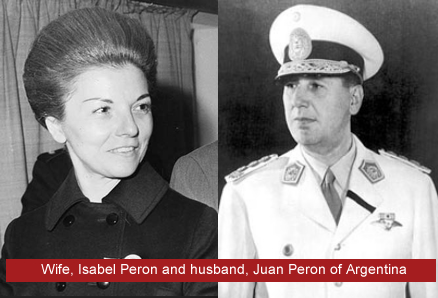 son from the Adams family in America while the Triple generation of father, daughter and grandson comes from the Nehru family in India.
son from the Adams family in America while the Triple generation of father, daughter and grandson comes from the Nehru family in India.
Starting with the husband and wife combination, the first experience came from the Peron family in Argentina. After President Juan Perón of Argentina died in office in 1974, his third wife, Isabel took over the reins of power from 1 July 1974 to 24 March 1976. She holds the distinction of being the first female president of any country in the world, even though she was unelected.
This husband and wife presidential combination repeated itself in the same country in 2007 when another female , Cristina Fernández de Kirchner became the president. She is the widow of the former President of Argentina, Nestor Kirchner. Argentina became the first country in the world to have two female presidents in 40 years.
, Cristina Fernández de Kirchner became the president. She is the widow of the former President of Argentina, Nestor Kirchner. Argentina became the first country in the world to have two female presidents in 40 years.
On the father and son combination, the first was the family of John Adams. He served as the second President of the United States of America (1797–1801) and his son, John Quincy Adams also served as the sixth President from 1825 to 1829. They were not the only father and son in America. The Bush family also achieved that feat.
George W. Bush Snr first served two terms as Vice President of the United States from 1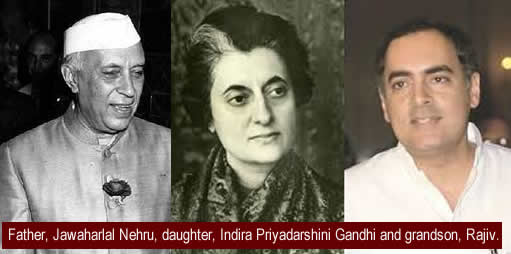 981 to 1989, and served as the 41st President of the United States from 1989 to 1993. He had a son George W. Bush jnr who replicated what the Quincy Adams did. He became the 43rd President of the United States on January 20, 2001.
981 to 1989, and served as the 41st President of the United States from 1989 to 1993. He had a son George W. Bush jnr who replicated what the Quincy Adams did. He became the 43rd President of the United States on January 20, 2001.
There was the Triple generation, father, daughter and grandson national leaders in India: Jawaharlal Nehru was the first PM of India from independence in 1947 till death in 1964. His daughter, Indira Priyadarshini Nehru (married to one Feroze Gandhi in 1942, not relative of Mahatma Ghandi) took over as Prime Minister from 1966 to 1977 and then again from 1980 until her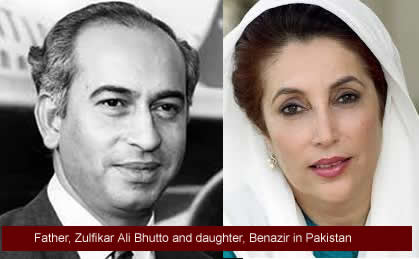 assassination in 1984, making her the second-longest-serving Prime Minister after her father. Indira was succeeded by her son Rajiv, serving from 1984 to 1989. When he took office after the 1984 assassination of his mother, he became the youngest Indian Prime Minister ever. The Nehru–Gandhi family is a prominent Indian political dynasty, a brand that has no peer in the world– producing three Presidents in a row and in charge of India for 40 of the near 70 years since independence.
assassination in 1984, making her the second-longest-serving Prime Minister after her father. Indira was succeeded by her son Rajiv, serving from 1984 to 1989. When he took office after the 1984 assassination of his mother, he became the youngest Indian Prime Minister ever. The Nehru–Gandhi family is a prominent Indian political dynasty, a brand that has no peer in the world– producing three Presidents in a row and in charge of India for 40 of the near 70 years since independence.
There was another father/daughter saga in Pakistan: the Ali Bhutto family. Father, Zulfikar Ali Bhutto, Pakistani 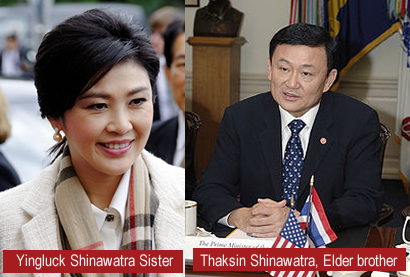 president (1971–73), and prime minister (1973–77) was a popular leader who was overthrown and executed publicly by hanging by the military. His daughter Benazir Bhutto rode on the popularity of his father to become the 11th and 13th Prime Minister of Pakistan, serving two non-consecutive terms in 1988–90 and then 1993–96. She was the first woman democratically elected as head of a majority Islamic nation. Like her father, she was killed in power.
president (1971–73), and prime minister (1973–77) was a popular leader who was overthrown and executed publicly by hanging by the military. His daughter Benazir Bhutto rode on the popularity of his father to become the 11th and 13th Prime Minister of Pakistan, serving two non-consecutive terms in 1988–90 and then 1993–96. She was the first woman democratically elected as head of a majority Islamic nation. Like her father, she was killed in power.
The siblings presidential saga first played out in Thailand. Thaksin Shinawatra born 26 July 1949 is a Thai businessman and politician who became the Prime minister of the country between 2001 and 2006. His younger sister, Yingluck Shinawatra, 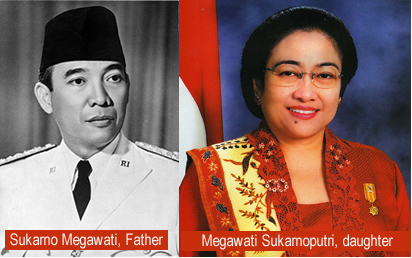 nicknamed Pu, also became the 28th Prime Minister of the country following the 2011 general election.
nicknamed Pu, also became the 28th Prime Minister of the country following the 2011 general election.
The father and daughter combination took place in Indonesia. The daughter, Diah Permata Megawati Setiawati Sukarnoputri, born 23 January 1947 served as president of Indonesia from 23 July 2001 to 20 October 2004. Megawati was Indonesia’s only female president and the sixth woman to lead a Muslim-majority country. She was daughter of Sukarno Sukarnoputri who was the first President of Indonesia, between 1945 and 1967.
Another father and daughter experience was in the Philippines. Gloria Macapagal Arroyo first served as the 10th 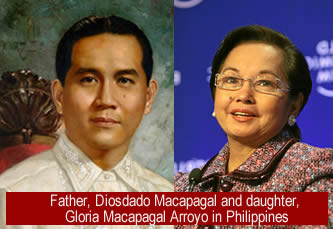 Vice President of the Philippines from 1998 to 2001 then as the 14th President from 2001 to 2010. She was the daughter of Diosdado Macapagal Diosdado who was the ninth President of the Philippines, 1961 to 1965.
Vice President of the Philippines from 1998 to 2001 then as the 14th President from 2001 to 2010. She was the daughter of Diosdado Macapagal Diosdado who was the ninth President of the Philippines, 1961 to 1965.
Africa has a more mixed experience. Seven countries on the continent have had both father and son (and one brother) lead the country: Botswana, Kenya, the Democratic Republic of the Congo (DRC), Gabon, Togo, Mauritius, and Malawi (Morocco and Swaziland are excluded from the list since they are kingdoms). In each of these cases, the succession process has been different, as has the interim between father and son.
Three sons of founding fathers (the first president or prime minister after independence) are currently in power. In Botswana, president Ian Khama son of Seretse Khama; in Kenya, President Uhuru Kenyatta son of Jomo Kenyatta and Prime Minister Navin Ramgoolam son of Sir Seewoosagur Ramgoolam in Mauritius.
In the case of all three, the successions took place over a decade after the fathers left offices: In Botswana, Khama was elected 27 years after  his father left office, while in Kenya, Kenyatta was elected 34 years after his father, and in Mauritius, Ramgoolam was elected 13 years after his father. Therefore, enough time had elapsed in which citizens could assess the impact and results of the father’s leadership and make an informed decision regarding the son.
his father left office, while in Kenya, Kenyatta was elected 34 years after his father, and in Mauritius, Ramgoolam was elected 13 years after his father. Therefore, enough time had elapsed in which citizens could assess the impact and results of the father’s leadership and make an informed decision regarding the son.
On the other hand, some sub-Saharan countries have experienced immediate succession by the son of the head of state after his father’s death, often leading to decades of rule by a single family.
Recently, Togo, a country of 3.5 million people, voted for incumbent president Faure Gnassingbé for a third time. Gnassingbé is the son and immediate successor of Togo’s fifth president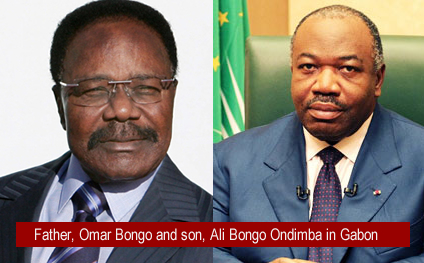 —Gnassingbé Eyadema. If he serves out his third term, his family would have run Togo for 48 years of its 55-year post-independence history, with five more years to go.
—Gnassingbé Eyadema. If he serves out his third term, his family would have run Togo for 48 years of its 55-year post-independence history, with five more years to go.
Gabon has a similar experience: Ali Bongo Ondimba (born Alain Bernard Bongo 9 February 1959) is a Gabonese politician who has been President of Gabon since October 2009. Bongo is the son of Omar Bongo who was President of Gabon from 1967 until his death in 2009. With a father and son at the head of the country for over 86 percent of the country’s post-independence history (1967-2009 and 2009-2016)—47 years out of almost 55 years—and the son is  still in power.
still in power.
In the Democratic Republic of Congo, president Joseph Kabila came to power in 2001 immediately following the untimely assassination of his father, Laurent. Altogether, the Kabilas have ruled the DRC for a third of the country’s post-independence history—almost 18 years.
The Rangoolam family of Mauritius has similarly ruled the country for over half of its independence history, for 20 out of 39 years. However, as noted above, succession was not immediate from father to son but rather through a contested process with two leaders in between.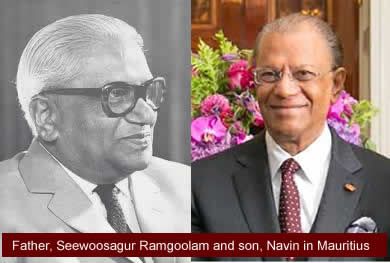
Just like in Thailand, Africa also had the Presidential sibling experience in Malawi. Arthur Peter Mutharika born 1940 is a Malawian politician, educator and lawyer who has been President of Malawi since 31 May 2014. He was earlier an adviser to his older brother, President Bingu wa Mutharika, on issues of foreign and domestic policy from the onset of his election campaign until the President’s death on 5 April 2012.
It is therefore a matter of pleasant history repeating itself if Hillary doubles as Clinton number Two in the White House.
How would Nigerians react to a father and son/daughter or husband and wife succession in Aso Rock? The possibility is not even in sight because we have not produced a president with enough candor and clout that would positively reflect on the public’s perception and appreciation of their descendants.
.
.
By Bola Adewara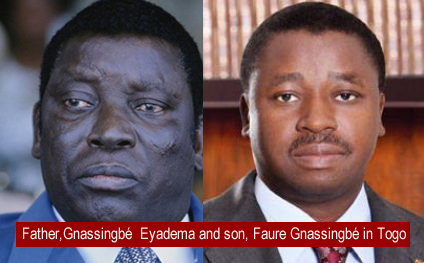
Follow me @bolaadewara
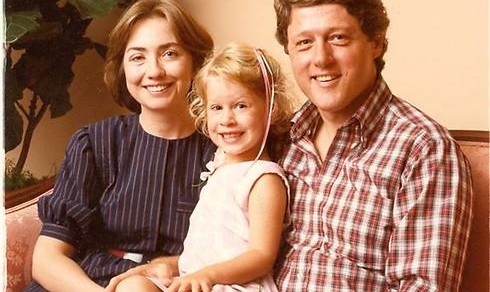
COMMENTS